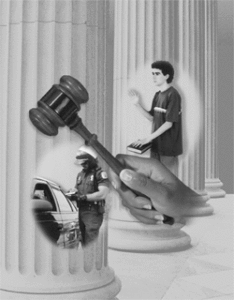 This blog is not a bar band: we take requests without asking for tips! Yesterday, we received a question from a reader who wants to understand the interplay of Child Endangering and DUI (called ‘OVI’ in Ohio). This article is going to answer that reader’s question. Ask and you shall receive.
This blog is not a bar band: we take requests without asking for tips! Yesterday, we received a question from a reader who wants to understand the interplay of Child Endangering and DUI (called ‘OVI’ in Ohio). This article is going to answer that reader’s question. Ask and you shall receive.
Articles Posted in DUI/OVI sentencing/penalties
Juvenile DUI / OVI in Ohio
 A recent news story reported the arrest of a 14-year-old boy for DUI (called ‘OVI’ in Ohio). It is somewhat unusual for a juvenile to be charged with OVI in Ohio. When a juvenile faces an OVI case, some aspects are the same as adult OVIs and some components are different. Those components include the investigation, the court process, and the penalties.
A recent news story reported the arrest of a 14-year-old boy for DUI (called ‘OVI’ in Ohio). It is somewhat unusual for a juvenile to be charged with OVI in Ohio. When a juvenile faces an OVI case, some aspects are the same as adult OVIs and some components are different. Those components include the investigation, the court process, and the penalties.
Patrick Mahomes, Sr. and Felony DUI / OVI
 Patrick Mahomes, Sr. was indicted for drunk driving in Texas. According to Spectrum News, Mahomes has two prior DWI convictions. In Texas, a third DWI (called ‘OVI’ in Ohio) is a felony offense which carries a prison term of two years to ten years. But what if a person is charged with a felony OVI in Ohio? Continue Reading
Patrick Mahomes, Sr. was indicted for drunk driving in Texas. According to Spectrum News, Mahomes has two prior DWI convictions. In Texas, a third DWI (called ‘OVI’ in Ohio) is a felony offense which carries a prison term of two years to ten years. But what if a person is charged with a felony OVI in Ohio? Continue Reading
DUI/OVI and Improperly Handling Firearms in Ohio
 Muhammad Wilkerson, former defensive end for the New York Jets, was arrested for Operating a Vehicle under the Influence and Unlawful Possession of a Loaded handgun. Wilkerson’s arrest occurred in New Jersey. If Wilkerson were arrested for these offenses in Ohio, he would be charged with OVI and Improperly Handling Firearms in a Motor Vehicle. This article describes the elements, court process, and potential penalties for these offenses in Ohio.
Muhammad Wilkerson, former defensive end for the New York Jets, was arrested for Operating a Vehicle under the Influence and Unlawful Possession of a Loaded handgun. Wilkerson’s arrest occurred in New Jersey. If Wilkerson were arrested for these offenses in Ohio, he would be charged with OVI and Improperly Handling Firearms in a Motor Vehicle. This article describes the elements, court process, and potential penalties for these offenses in Ohio.
How Does a DUI/OVI in Ohio Affect Employment?
 Following his recent arrest for DUI (called ‘OVI’ in Ohio), Bob Huggins resigned from his position as the men’s basketball coach at West Virginia University. His situation is illustrative of many high-profile individuals who have lost jobs due to a DUI/OVI. But it is not only high-profile individuals who face employment consequences for OVI cases. We are frequently asked the following questions about OVI cases and employment.
Following his recent arrest for DUI (called ‘OVI’ in Ohio), Bob Huggins resigned from his position as the men’s basketball coach at West Virginia University. His situation is illustrative of many high-profile individuals who have lost jobs due to a DUI/OVI. But it is not only high-profile individuals who face employment consequences for OVI cases. We are frequently asked the following questions about OVI cases and employment.
Repeat DUI /OVI Offenses in Ohio
 According to a story by NBC4i, the Ohio State Highway Patrol reports that 30% of DUI arrests (called ‘OVI’ in Ohio’) come from repeat offenders. In Ohio, the mandatory OVI penalties increase with every conviction in ten-years (called the ‘lookback period’). Those penalties include vehicle sanctions, license suspensions, incarceration, and other consequences.
According to a story by NBC4i, the Ohio State Highway Patrol reports that 30% of DUI arrests (called ‘OVI’ in Ohio’) come from repeat offenders. In Ohio, the mandatory OVI penalties increase with every conviction in ten-years (called the ‘lookback period’). Those penalties include vehicle sanctions, license suspensions, incarceration, and other consequences.
Yellow License Plates for DUI/OVI in Ohio
 The special license plates for DUI offenders are commonly referred to as “party plates” and “family plates”. The official term in Ohio is “restricted license plates”. Whatever you call them, nobody wants them. In Ohio, the plates are yellow with red lettering, and they signal to everybody the driver of that vehicle was convicted of DUI (called ‘OVI’ in Ohio). This article explains when the plates are required, how they are obtained, and possible penalties for restricted plate violations.
The special license plates for DUI offenders are commonly referred to as “party plates” and “family plates”. The official term in Ohio is “restricted license plates”. Whatever you call them, nobody wants them. In Ohio, the plates are yellow with red lettering, and they signal to everybody the driver of that vehicle was convicted of DUI (called ‘OVI’ in Ohio). This article explains when the plates are required, how they are obtained, and possible penalties for restricted plate violations.
Where Does Ohio Rank for Drunk Driving Rates?
 Everything gets ranked these days, including sports teams, colleges, students, lawyers, vacations, and products. For products, you can find lists of everything from the best weight-loss pills to the best vacuum cleaners. Neither of those is recommended as a gift, by the way, even though it is the holiday season. And because it is the holiday season, one thing being ranked is drunk driving rates. A recent Forbes article compares the rates among the 50 states and D.C.
Everything gets ranked these days, including sports teams, colleges, students, lawyers, vacations, and products. For products, you can find lists of everything from the best weight-loss pills to the best vacuum cleaners. Neither of those is recommended as a gift, by the way, even though it is the holiday season. And because it is the holiday season, one thing being ranked is drunk driving rates. A recent Forbes article compares the rates among the 50 states and D.C.
Ohio Supreme Court: Forfeiture of $31,000 Vehicle for DUI/OVI Not Excessive
 Back in 1791, when the 8th Constitutional Amendment was ratified, the Framers of the Constitution decided there should be limits on financial sanctions for criminal behavior. Accordingly, the 8th Amendment prohibits ‘excessive fines’. Courts have interpreted the Constitutional prohibition of excessive fines to apply to forfeiture of property in criminal cases. The Ohio Supreme Court recently held that forfeiture of a $31,000 vehicle for a repeat DUI conviction (called ‘OVI’ in Ohio) does not violate the Excessive Fines Clause of the 8th Amendment.
Back in 1791, when the 8th Constitutional Amendment was ratified, the Framers of the Constitution decided there should be limits on financial sanctions for criminal behavior. Accordingly, the 8th Amendment prohibits ‘excessive fines’. Courts have interpreted the Constitutional prohibition of excessive fines to apply to forfeiture of property in criminal cases. The Ohio Supreme Court recently held that forfeiture of a $31,000 vehicle for a repeat DUI conviction (called ‘OVI’ in Ohio) does not violate the Excessive Fines Clause of the 8th Amendment.
Ignition Interlock Devices for Ohio DUI / OVI
 From the 2008 Lindsay Lohan stories to the 2022 news reports about Paul Pelosi’s DUI conviction, the past 14 years have shown a dramatic increase in the use of ignition interlock devices (IIDs) for individuals charged with DUI (called ‘OVI’ in Ohio). A recent report by Coherent Market Insights indicates IIDs in North America will be a $68.5 million industry by 2027. In Ohio, the increased use of IIDs is due, in part, to Annie’s Law. IIDs may be an effective method of preventing OVI, but they do have drawbacks.
From the 2008 Lindsay Lohan stories to the 2022 news reports about Paul Pelosi’s DUI conviction, the past 14 years have shown a dramatic increase in the use of ignition interlock devices (IIDs) for individuals charged with DUI (called ‘OVI’ in Ohio). A recent report by Coherent Market Insights indicates IIDs in North America will be a $68.5 million industry by 2027. In Ohio, the increased use of IIDs is due, in part, to Annie’s Law. IIDs may be an effective method of preventing OVI, but they do have drawbacks.
 Columbus OVI/DUI Attorney Blog
Columbus OVI/DUI Attorney Blog

